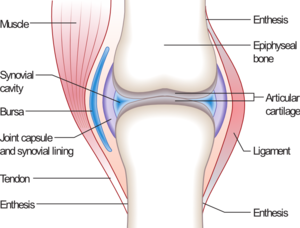Joint injury can result in irreversible damage of cartilage
Joint injury can result in irreversible damage of cartilage which, despite treatment and surgery, often eventually leads to osteoarthritis (OA) in later life. New research published in BioMed Central‘s open access journal Arthritis Research & Therapy demonstrates that short term treatment of damaged cartilage with glucocorticoids can reduce long term degenerative changes and may provide hope for prevention of OA after injury.
A normal joint is covered by a layer of cartilage containing proteoglycans such as aggrecan and lubricating fluid containing glycosaminoglycans (GAG) such as hyaluronic acid. In a double whammy, after injury proteoglycans and other molecules in cartilage begin to break down and the synthesis of these proteoglycans within cartilage is reduced. Additionally proinflammatory cytokines such as TNF?, IL-1?, and IL-6 are released into the synovial fluid after injury and further increase GAG loss from cartilage.
Using a ‘worst-case scenario’ system in which cartilage was subjected to mechanical injury and bombarded with immune system-stimulating bio-molecules (TNF? and IL-6) the glucocorticoid dexamethasone (DEX) was able to reduce GAG loss and restore proteoglycan synthesis levels to normal.
Bookmark this page for “glucocorticoid” and check back regularly as these articles update on a very frequent basis. The view is set to “news”. Try clicking on “video” and “2” for more articles.








